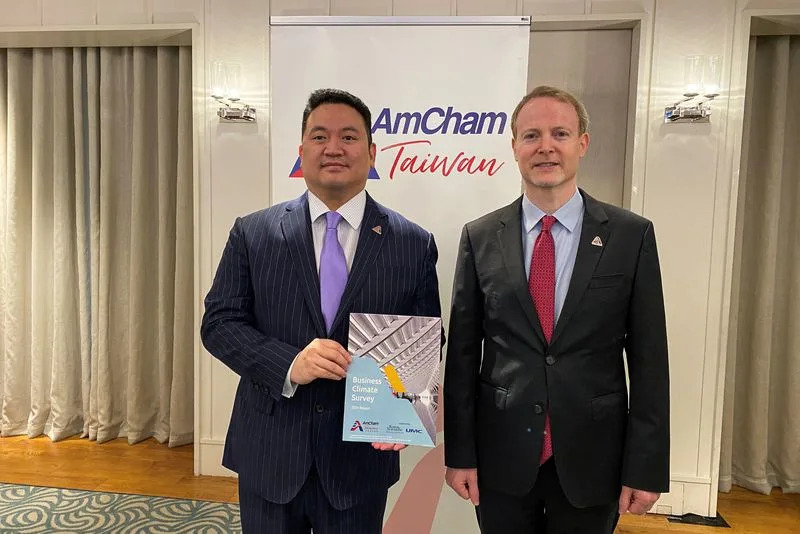Taiwan's government expressed anger after China "unilaterally" changed a flight path close to the sensitive median line in the Taiwan Strait, saying it appeared to be a deliberate attempt to change the status quo for possible military means.
China's civil aviation administration said in a short statement late Tuesday that from Thursday it was cancelling an "offset measure" for the southbound operation of the M503 flight route, which is just west of the strait's median line.
The median line had for years served as an unofficial barrier between Chinese-claimed Taiwan and China, but China says it does not recognise its existence and Chinese warplanes now regularly fly over it as Beijing seeks to pressure Taipei to accept its sovereignty claims.
China also said it was opening routes from west to east - in other words in the direction of Taiwan - on two flight paths from China's Xiamen and Fuzhou city which are close to the Taiwanese-controlled island groups of Kinmen and Matsu.
Taiwan's civil aviation administration and China-policy making Mainland Affairs Council both labelled the moves as "unilateral" and that they strongly protested it.
The Mainland Affairs Council said China was ignoring flight safety, disrespecting Taiwan and trying to "package" civil aviation for political or military considerations to potentially change the status quo in the strait.
"If the mainland side clings obstinately to its course, it must bear any serious consequences affecting cross-strait relations," it said.
China's Taiwan Affairs Office described the changes as "routine" and to help alleviate pressure on air space.
"It is also conducive to improving cross-strait flight operations and further facilitating cross-strait people-to-people exchanges, which are in line with the common interests of compatriots on both sides of the strait," it said in a statement.
Taiwan air force shows off its sub hunting, early warning prowess.
A member of the Taiwan Air Force looks on as an E-2K aircraft flies past during a demonstration for the media at the Pingtung air base in Pingtung.
Taiwan's air force showed off its armed-to-the-teeth submarine hunters and early warning and control aircraft on Tuesday, demonstrating how it keeps watch on the skies and waters around the Chinese-claimed island.
China, which views Taiwan as its own territory, has over the past four years regularly sent warplanes and warships into the skies and waters around the island as it seeks to assert sovereignty claims that the government in Taipei rejects.
Taiwan's air force, dwarfed by China's but well-armed with mostly U.S. equipment, has been at the front lines of responding to these missions and regularly scrambles to shadow and warn away Chinese aircraft and ships.
On a defence ministry-organised media visit to the Pingtung air base in southern Taiwan, the air force displayed its Lockheed Martin P-3C Orion anti-submarine aircraft and Northrop Grumman-built E-2K Hawkeye early warning and control aircraft.
Crews demonstrated attaching missiles under the wing of an Orion, which can be armed with torpedoes, depth charges and U.S.-made Maverick air-to-ground missiles and Harpoon anti-ship missiles.
"We uphold the concept of integrating training for war under the guidance of the defence ministry. We are doing very solid training, which is enough to cope with various situations," said training officer Tsai Tsung-yu.
Taiwan operates 12 Orions, which the U.S. government approved the sale of in 2007 for almost $2 billion. The first aircraft, surplus U.S. Navy stock, entered service with Taiwan in 2013 and can stay airborne for up to 12 hours.
The air force also conducted flybys with one of their E-2K Hawkeye aircraft. Taiwan has six of the planes, but one was damaged in 2022 during a landing accident and is still being repaired.
They have long-range detection abilities, allowing them to direct intercepts from the air and track low-altitude targets flying below the range of ground-based radars.
Their Pingtung base gives the aircraft easy access not only to the Taiwan Strait but also to the Bashi Channel.
That strategic waterway separates Taiwan from the Philippines and connects the South China Sea with the Pacific. Taiwan has reported Chinese warships and warplanes frequently passing through the Bashi Channel.
US business group in Taiwan sees falling but still high geopolitical concerns
AmCham Taiwan President Patrick Lin and Chairperson Dan Silver pose with a copy of the 2024 Business Climate Survey in Taipei.
Almost half of companies surveyed by the American Chamber of Commerce (AmCham) in Taiwan consider geopolitical concerns a deterrence to expanding or investing in the island but that number has significantly dropped even as China tensions remain.
China, which views democratically governed Taiwan as its own territory despite the objections of the Taipei government, has been stepping up military and political pressure to assert those sovereignty claims.
Lai Ching-te of the ruling Democratic Progressive Party (DPP), who China views as a dangerous separatist, won this month's presidential election and will take office on May 20, though his party lost its parliamentary majority.
In a survey released on Tuesday, which took place between Nov. 20 and Dec. 15, AmCham Taiwan said 46% of respondents considered "geopolitical uncertainty" the top factor deterring them from expanding or investing in Taiwan.
While that was down 20 percentage points from the previous survey, it was still higher than other factors like bureaucracy and a shortage of skilled labour.
"So while they see geopolitics as a risk, it is not so much of a deterrence," AmCham Taiwan Chairperson Dan Silver told reporters.
More than half of respondents said relations with China should be a priority for Taiwan's government in the next three years.
"Although our members don't express high levels of concern about action from China, businesses do need a stable and peaceful environment to prosper," added AmCham Taiwan President Patrick Lin.
AmCham Taiwan, which said that 223 of its 444 eligible members responded to the survey, said 92% planned to maintain or increase investment in the island this year, noting confidence in Taiwan is "flying high".
The group has called for an ambitious agenda to accelerate economic cooperation with Taiwan through a new Taiwan-U.S. trade talks framework - and eventually a bilateral trade agreement, which Taiwan's government has also pushed for.
Silver said he thought the prospects for such a deal were "modest" but that Taiwan needed to "seek with urgency and respond with urgency to outreach from the United States to move towards new agreements".





